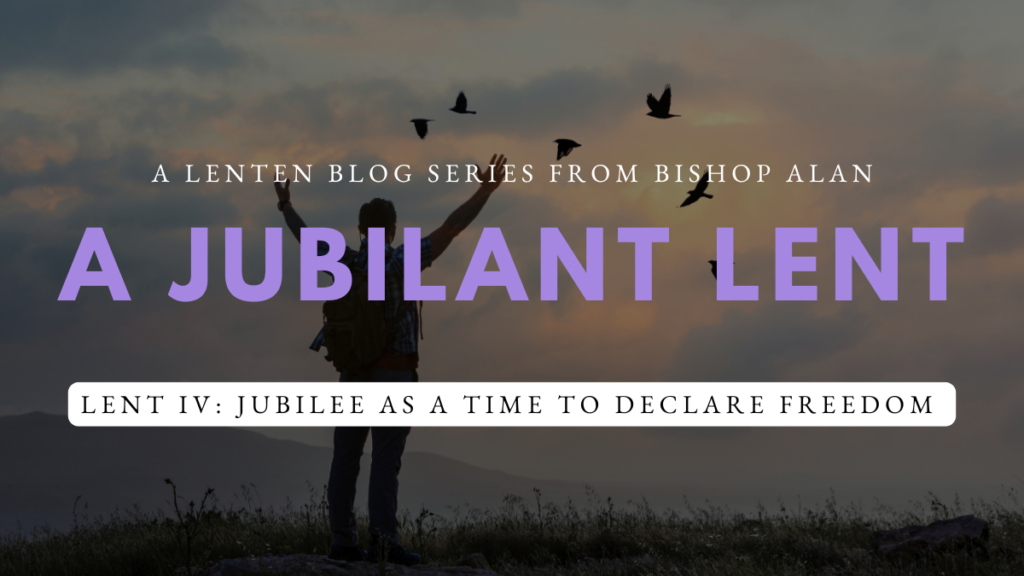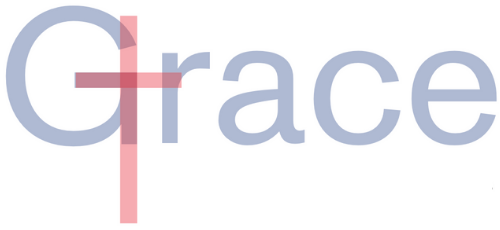
Probably we are all familiar with the poem about older age – “when I am an old woman, I shall wear purple”. It is a statement about independence and freedom. It is a declaration of not giving a damn. And it is a fitting quote to introduce the third concept wrapped up in God’s idea of Jubilee.
For enslaved people, of course, this is much more than a personal intention of forthrightness. And this applies to anyone enduring an experience of oppression and underprivilege. In the story of the exodus, God had the suffering of God’s children firmly in sight. Jubilee of course is all about declaring freedom – freedom for the land from a year of labor in being ploughed over, fertilized, sown and harvested; freedom for people from the burden of indebtedness they have accumulated over the years – both literally in economic terms, and also in the more figurative ways related to our capacity to incur the need for forgiveness and for fresh starts.
It is also about being an agent of freedom – living life liberated from our fears and hidings, our masks and pretenses. Authenticity characterizes this jubilee work; to be people who walk the talk and talk the walk. We are freed to reach out our arms of love to embrace the forgotten and neglected, and to bring freedom to the oppressed. It is about whom we notice. It is about our life of prayer. It is also about our life of action. It is about our desire for justice. It is about reaching out to fulfil our highest beliefs in the human condition. It is about nurturing a practical and profound love for everyone, and an upholding of our mutual sense of dignity. If you been able to read 1 Corinthians 13 any time this Lent, as I suggested on Ash Wednesday, the Jubilee of declaring freedom is about that kind of love.
Maria Harris, whose book “Proclaim Jubilee – a spirituality for the twenty first century” has been a key resource for this series of reflections on Jubilee, takes us deeper. We must consider not only from what we are made free, but also for what we are free. She mentions the freedom to go home, which is a theme we will pick up next week. And continues with the freedom to remember and the freedom to recreate in community.
As an older person I resonate with the sense of freedom to remember. I recall a ninety-year old parishioner who was mostly restricted to her bed, telling me that her daughter visited and asked her “mother, what are you doing?” as her mother laid with her eyes closed. “I am living my life”, she replied, which she explained to me meant that she was sitting and remembering, picturing people and places. Remembering is also reconnecting. I think more and more about the things my dad did with me – two mile walks on Saturday to watch our local football (soccer) team; his running up and down a playing field with me tossing a rugby ball back and forth, always making sure it went backwards as we moved forward.
In the hustle and bustle of an active life, regretfully I spent less time with my dad, as he, in turn, reached the point of sitting in his favorite chair (you know – the one we all refused to sit in after he died, until my mother broke the reluctance) as he was increasingly limited with COPD. I got busy. I don’t know if he was visited by the freedom of memory and living his life through them, but I hope so. It makes you realize what a gift Jubilee offers. It says “enough with the busyness already! Find the freedom to remember”.
“Memory and remembering means bearing witness and telling stories”, writes Harris, “Possibly, like going home, this work takes on special importance as human beings gather up our accumulating periods of seven years and approach, and then pass the forty-ninth and fiftieth years, where personal development tasks like the life review, the use of reminiscence, and the composition of memoirs begin to claim us”. She goes on to describe this as practice for the community as much as for individuals. And as such it is also a practice for future generations. Our family on my wife’s side has a small journal from Donna’s great- great grandfather, Byrd Prillerman. He was a child at emancipation and walked with his family 250 miles from Southern Virginia to West Virginia. He describes his grandmother, as well as his parents. His grandfather was the slave owner. Byrd became an educator and a founder of what became West Virginia State College, where a hall stands bearing his name. Byrd now has a great-great-great grandson who carries his name, too.
When we all receive the freedom to remember, we note that not all the memories are as pleasant as running up and down a rugby pitch. Memories can be dangerous, notes Harris. We touch memories of suffering along with memories of freedom. And it how we let jubilee liberate us to embrace both that enriches our lives. We do that in church every Sunday. We tell a story of suffering, death and resurrection. We intentionally begin with sorrow and end in jubilation. We move, as a companion priest In Kansas tells his congregation, from the liturgy of the Eucharist to the “liturgy of life”.
The freedom to recreate happens in sabbath keeping. Every coach knows that rest days are not rest days for the body, they are rebuilding days. Just as much happens as we sleep, so we need to see the freedom offered to us in sabbath as a time to recreate. Again, it is not only personal but also communal. This is church at its best – and here I return to my cynicism about the collect for Saturdays, and its judgement upon the way we are tempted to make church yet another busy task, and not the Jubilee gift of recreation.
“Rabbi Marc Gellman offers a midrash (a story about a story in the Bible) on creation that he calls “Partners” as a way of exploring what recreation means. The midrash begins with the angels asking God to clean up the chaos that preceded creation, and after each major creative work – stars, oceans, four-legged animals – the angels ask God whether the world is finished yet. Regularly God answers, “nope”. Eventually God makes a woman and a man and says to them “Please finish up the world for me. I’m tired now and really, it’s almost done”. The man and the woman at first resist this request, saying to God, “We can’t do that. You have the plans and we are too little.” So, God agrees to a deal where if they keep trying to finish the world, God will be their partner. This divine-human partnership is described in the midrash as “finishing the world”, but it is actually the work of repair and recreation for which Jubilee frees God’s people”. (Harris p. 65)
Our acrostic on the Grace wall ends with “Equipping the saints to change the world”. In this context I think I prefer the idea of repairing the world. So, I ask how does the liberating action of Jubilee equip you for partnering God in “repairing the world”? From what are you set free? And for what are you made free? Are you free to remember, free to recreate?

Recent Comments